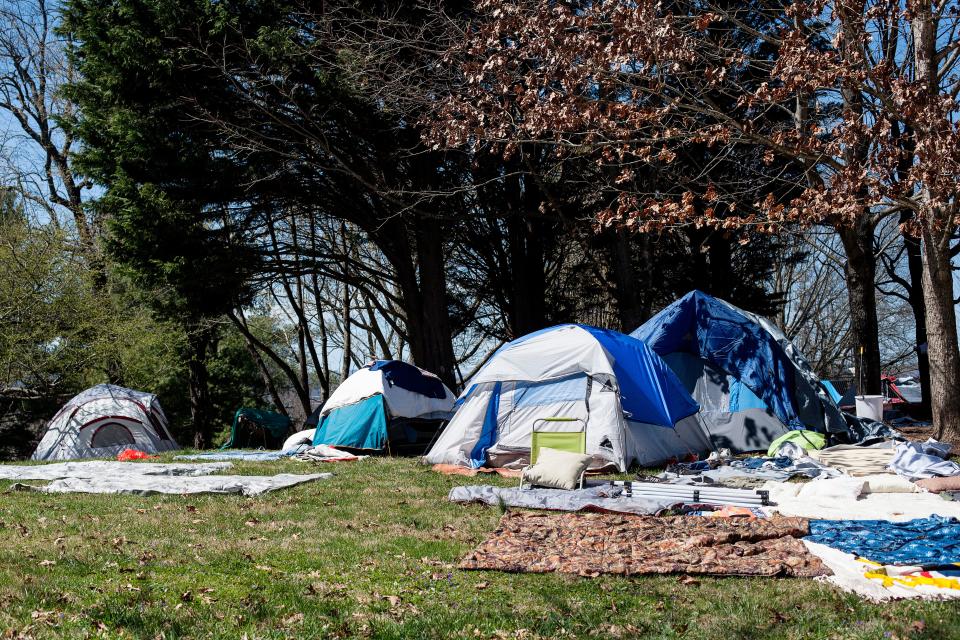Possible Asheville food sharing ordinance sparks outrage in community, city combats rumors

Asheville residents voiced their concerns, and in some cases, outrage, over a recently circulating document that details a potential city ordinance that would limit food distribution in public parks, which they say will impact some of the community's most vulnerable populations, including people who are homeless.
The document was part of a Jan. 20 City Council check-in, conversations between three or fewer council members held between formal council meetings. Rumors of its content spurred Asheville advocates, nonprofits and faith organizations -- with over two dozen people speaking at City Council and the Public Safety Committee meeting Jan. 25, and a petition opposing the action garnering more than 3,000 signatures in a matter of days.
"It ties the hands of some of the most important services happening in our community," said Amy Cantrell, co-director of Beloved Asheville, the nonprofit behind the petition.
Cantrell said she was "floored" to hear consideration of an ordinance -- and she said people must step up immediately to ensure there is no regulation in the future.
The city attempted to quell the rumors with a Jan. 24 news release that said the city has "no intention of banning food distribution in City parks."
More: New Asheville Code Purple shelter opens to serve the 'most vulnerable'
Rather, the release said the city is engaging in research regarding the safe distribution of food in city parks, and "exploring ways to balance this compassionate act with a safe environment."
Large Group Accommodation O... by Sarah Honosky
The Citizen Times obtained the document through a request from the city's public records officer, Leslie Coty, titled "Large Group Accommodations Ordinance," which contained research relating to other city ordinances as well as a "Potential Asheville Ordinance."
The city response
At the Jan. 25 council meeting, City Manager Debra Campbell brought up the topic during her manager's report and deferred to a statement from attorney Brad Branham.
Branham said he was seeking to provide clarity around an issue that has generated a "tremendous amount of public attention."
The ordinance was not on the agenda that evening, or any future agenda, he said, and staff was in the "very early stages" of researching options to allow food sharing to continue, but to do so in a way that would also "maintain the safety" of those participating in the program and the sanitation of parks.

Related: Asheville police to implement new homelessness policy following camp removals, arrests
“I want to reiterate, there is absolutely no research being conducted right now to prohibit the sharing of food in public parks or anywhere else in the city," Branham said.
"Instead, it is the city’s goal to ensure that this practice can actually continue in a safe manner, and that the cleanliness of our parks is not adversely impacted in the process.”
According to the potential ordinance document, it would be unlawful to conduct the delivery and service of food in groups more than 25 people without a Large Group Accommodation Permit issued by the city.
It also outlined that no more than two such permits could be issued to the same person or organization in the same park each year.
Organizations like Beloved distribute resources, including food, several times a week.
Many residents are fearful how an ordinance would impact the city's unhoused community and the many people that rely on food distribution in public spaces.
There are regular food distributions at public parks across the city, like Pritchard, Shiloh and Aston parks, and nonprofits like Asheville Food Connection are pursuing mobile meal delivery options, which could also face impacts if barriers arise.
According to the city release, this is only one option the city is exploring to assuage "tension between food distribution in the parks which in some cases leaves behind a great deal of trash, and impacts park users and the surrounding neighborhoods and businesses."
"Permits would be given freely and would help to ensure that health and safety standards are met, as well as maintaining the parks free from litter," said the release.
"This idea is in the exploratory stage and has not been presented to Council for policy consideration."

Before any action could take place, the policy would be placed on a City Council agenda and discussed.
In response to concerns, Council member Kim Roney asked at the Jan. 25 meeting for any future effort on this topic to be withdrawn.
Homelessness: 'Nowhere to go,' says Asheville's Ramada Inn shelter director of struggle to rehouse residents
After this request was met with silence, Mayor Esther Manheimer reiterated that staff is "more at the research stage and looking at options, so we will have the opportunity to look at this more."
Council member Sage Turner said the information came to council at a check-in after a question was submitted about how other cities handle feeding large crowds.
For her check-in, she said there was minimal conversation about the topic.
"I hope we do move forward in reviewing this item," she said. "If only to increase the understanding of what is happening throughout the community, in various places, on various days. ... I'm all for continuing to discuss it and explore how we can be better."
Community outrage
Of those who spoke at the public hearing, some responded with disgust, others calling it a "war against houseless people in this city."
"It would have a huge impact," said Cantrell. She said it dissipates energy away from solutions, and "adds layers of barriers," heavily curtailing organizations' ability to share resources.
Marisha MacMorran, executive director of Asheville Food connection, was among the concerned community stakeholders.
MacMorran said Food Connection strongly believes the city should not regulate food sharing in any capacity, though they are sensitive to the challenges the city faces in regard to public safety.
She began to hear rumors of the ordinance on Jan. 20 but saw the document for the first time on Jan. 24.
Encampment clearing: Homeless encampment on French Broad cleared; 'no idea' what comes next
"Anything that would prohibit (food sharing) in any fashion is alarming to us," MacMorran said.
“It’s really important to recognize the communities that would be impacted by a ripple effect of an ordinance like this,” she said.

As well as the chronically unhoused, many of whom congregate in public parks, the impact would reach even further -- touching the elderly, children, working families and people experiencing different stages of food insecurity.
People are already stretched thin, she said, and even the swirling rumors have cost energy and time from nonprofits, faith leaders and other agencies.
If this is the precursor to policy, she fears how an actual ordinance would reduce their capacity to serve the community.
MacMorran, Cantrell and many of the speakers at public comment said the city messaging was confusing -- reading the ordinance document, it seemed like "more than just an idea."
“At the very least we feel strongly that this kind of decision-making ... not just the final vote, from the research phase on, requires input from the nonprofits, the faith-based organizations, and the people that are serving and the people that are being served,” MacMorran said.
Other food justice advocates, like Chloe Moore, a farmer who works for both Shiloh and Southside community gardens, spoke out at the Jan. 25 Public Safety Committee meeting.
“Sharing food is a really important part of my job, it’s what it’s all about," she said during public comment, referencing free produce often shared at Shiloh Park, catching people after football practice or gathered on warm days.
She said an ordinance like this targets oppressed people -- like houseless individuals, Black people and poor people.
“Those of us who really believe in food justice are always going to continue sharing food in our communities, no matter what happens. We’re not going to stop," Moore said. "It’s council responsibility if we are going to be jailed for what we do for our communities, or if we’re going to be supported.”
Council frustration
Vice Mayor Sheneika Smith spoke up following the public comments, in part because her name came up numerous times, with speakers saying she had visited a food distribution site that weekend and mentioned the potential of permitting in the future.

She confirmed that she visited people handing out food at Aston Park over the weekend, what she called "very honorable work," and said her effort to connect with groups around this matter had been "vilified."
“It is because of a person on this council leaking information to the public and allowing the discrepancies within the information that they shared to fester. It made connection to stakeholders around this matter very hard," she said at the council meeting.
She said the information was released to the public prematurely and without context.
"If we go forward with the information that is being researched, we will be preventing accessibility to a major group who need hot meals on the weekends. ... The direction that we were researching to go, that will absolutely not work.”
Manheimer reiterated that council has a process to bring these items forward for consideration, one that ultimately includes public input and conversations with stakeholders.
One benefit to being on council, she said, was having the city manager, attorney and clerk at your disposal to answer questions, which council frequently does.
“It is very difficult to be an elected leader, trying to wade through complex issues and learn more, without those resources available to you, and we have generally honored that system," Manheimer said.
"When that system isn’t honored, there is a great deal of confusion created in the community. It undermines the integrity of this body.”
Sarah Honosky is the city government reporter for the Asheville Citizen Times, part of the USA TODAY Network. News Tips? Email shonosky@citizentimes.com or message on Twitter at @slhonosky.
This article originally appeared on Asheville Citizen Times: Potential Asheville food distribution ordinance triggers outrage

